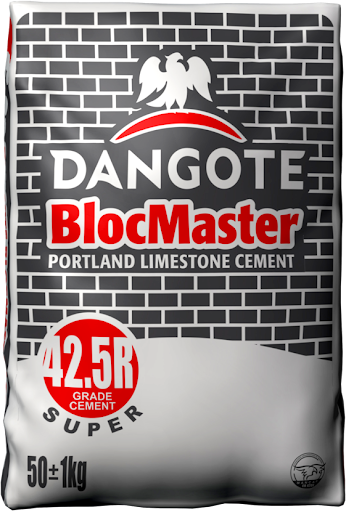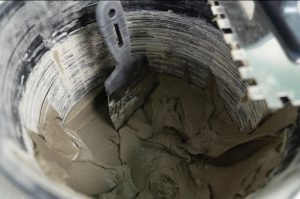If you’re looking to start any construction project, how and where to purchase original cement will most likely be a huge consideration. Unfortunately, the market is flooded with fake cement and using counterfeit cement can compromise the strength and durability of your building. You’ve probably been wondering how you can tell if the cement you’re buying is genuine. This post contains some practical tips to help you identify fake cement.
Let’s get into it!
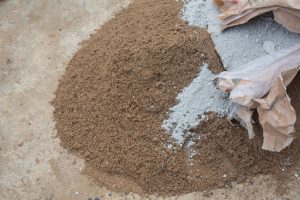 Check the Packaging
Check the Packaging
First, always examine the packaging. Genuine cement brands pay attention to detail and for a notable brand like Dangote, you shouldn’t expect less. The bag should be well-sealed and made of high-quality material. Look for the brand name, logo, and manufacturing details. These should be clear and printed without smudges.
Additionally, check the weight. Standard cement bags weigh 50 kilograms. If the bag feels unusually light, it could be a huge red flag. If possible, use a weighing scale to confirm the weight if you have doubts.
Also, pay attention to the batch number and manufacturing date. Genuine cement bags have these details clearly printed. If they are missing or look tampered with, think twice before purchasing.
Inspect the Cement Color
Another way to spot fake cement is by checking its color. Real cement such as Dangote Cement Blocmaster has a consistent grey color. The shade may vary slightly between brands, but it should always be uniform.
Fake cement, on the other hand, might have an unusual color. If you notice streaks of different shades or a completely different color, it’s likely a counterfeit product. Always trust your eyes; if it looks off, it probably is.
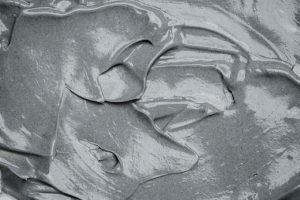
Test for Smoothness
Quality cement feels smooth when rubbed between your fingers. To test, take a small amount of cement and rub it between your thumb and index finger. Genuine cement will feel smooth and fine, almost like talcum powder.
Fake cement, however, may feel gritty or coarse. This rough texture indicates impurities or substandard materials. If the cement doesn’t pass the smoothness test, it’s best to avoid using it as it may be a counterfeit product.
Conduct a Water Test
A simple water test can also help you identify fake cement. Take a small amount of cement and drop it into a bowl of water. Original cement including Dangote Cement Falcon Kwikset will float for a few seconds before sinking slowly to the bottom. This behavior is due to the fine particles and proper composition of real cement.
However, if the cement sinks immediately or dissolves quickly, it’s likely a fake. Poor-quality or counterfeit cement lacks the proper binding agents, which affects its behavior in water.
Look for the SON Certification Mark
In many countries, including Nigeria, original cement is certified by the Standard Organization of Nigeria (SON). Look for the SON certification mark on the packaging. This mark indicates that the cement meets the required quality standards.
If the SON mark is missing, the cement may be counterfeit. Be cautious, as some fake products may try to mimic this mark. Ensure the mark looks authentic and is not just a poorly printed imitation.
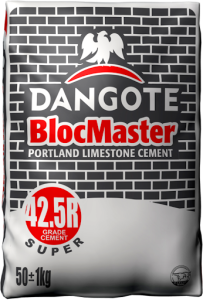
Verify the Brand’s Reputation
Brand reputation is another important factor. Established brands like Dangote Cement PLC are less likely to produce counterfeit products. However, this doesn’t mean you should trust the brand name alone. Sadly, fake cement manufacturers often use names that closely resemble well-known brands. They may change a letter or use a similar logo to confuse buyers. Always verify the brand’s reputation and purchase from trusted suppliers.
Conduct a Setting Time Test
Cement has a specific setting time, which is how long it takes to harden. Genuine cement typically starts to set within 30 minutes of mixing with water and it should reach its final setting within 10 hours. To test this, mix a small amount of cement such as Dangote Cement Blocmaster with water and observe how long it takes to set. If the cement hardens too quickly or takes much longer than expected, it’s likely fake.
Seek Expert Advice
If you’re still unsure, seek expert advice. Builders, contractors, and construction professionals can help you identify fake cement. They have experience and can spot counterfeit products more easily.
You can also take a sample of the cement to a laboratory for testing. While this may not be practical for every purchase, it’s a good option if you’re buying in bulk or for a critical project.
Trust Your Supplier
Finally, the best way to avoid fake cement is to buy from a trusted supplier. Reputable suppliers are less likely to sell counterfeit products. They value their reputation and usually source their products directly from manufacturers.
If you’re unsure about a supplier, do some research. Look for reviews or ask for recommendations from other builders. A little due diligence can save you from the costly mistake of using fake cement.
At Dangote cement, you can find the list of accredited distributors to ensure that you’re buying only original products.
Conclusion
Identifying fake cement is essential for any construction project. From checking the packaging to conducting simple tests, there are many ways to ensure you’re getting the real deal. Always be vigilant and trust your instincts. If something doesn’t seem right, it’s better to investigate further. By taking these precautions, you can protect your investment and ensure the longevity of your construction.
At Dangote Cement, we are committed to producing cement of dependable quality, so when you buy our product, you are not just buying cement, you are also buying a promise of strength.

